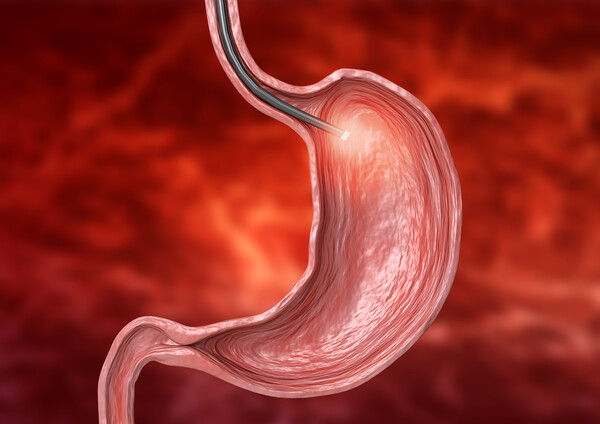[Jeong Jae-hoon's Column on Food & Drug]

Spicy foods don't cause stomach ulcers. The human stomach is strong. If you already suffer from a stomach ulcer or gastritis, eating spicy foods can temporarily worsen the symptoms. However, eating these foods won't cause stomach ulcers that don't already exist. Drinking beverages that contain a lot of organic acids, such as orange juice, won't cause stomach problems. Stomach acid is hydrochloric acid, a strong acid that's not comparable to the organic acids in juice. If your stomach can handle that kind of acid, it's unlikely that drinking juice will affect it. Similarly, drinking coffee on an empty stomach won't damage your stomach. This is because there's a layer of mucus that protects the lining of the stomach from food and stomach acid. A 2013 Japanese study of 8013 healthy adults found no association between coffee consumption and stomach ulcers, duodenal ulcers, or gastroesophageal reflux disease (GERD).
However, some people experience heartburn when drinking coffee on an empty stomach in the morning. This may be because the esophagus is irritated, not the stomach. While the stomach has a good defense against acid, the esophagus is relatively vulnerable. When acid and food reflux from the stomach into the esophagus, the lining of the esophagus is irritated, causing heartburn. This is why you sometimes feel uncomfortable after drinking juice because your esophagus is irritated, not your stomach. To prevent this reflux, there's a sphincter between the stomach and esophagus. Excessive caffeine, chocolate, alcohol, peppermint, and high-fat diets can loosen the sphincter in some people and worsen GERD symptoms. While this isn't the case for everyone, if you feel uncomfortable after eating these foods, you may want to eat less.
To support the stomach's efforts to protect yourself, avoid drinking alcohol and smoking. Alcohol damages the gastric mucosa, weakening its defenses. Nicotine reduces the substances that protect the gastric mucosa (prostaglandins) and produces oxidizing substances that damage the lining of the stomach, causing it to attack. It's the medications, not the food, that cause problems for the stomach. Not only do they directly irritate the stomach lining, but they also cause it to produce less protective substances. The longer you take them, the greater the risk of developing a stomach ulcer. That's why you shouldn't make a habit of taking NSAIDs for a long time without consulting your doctor or pharmacist. If you have a stomach ulcer, it's better to use a medication that has less of an effect on the stomach mucosa, rather than a regular NSAID. They're often combined with medications that reduce stomach acid secretion to reduce damage to the stomach.
The primary threat to the Korean stomach isn't spicy cuisine, but communal dining. Helicobacter infection stands as the leading culprit behind gastritis, stomach ulcers, and stomach cancer. Opting for shared dishes instead of individual servings increases the likelihood of acquiring H. pylori. To steer clear of stomach ulcers, refrain from communal food sharing.

Jeong Jae-hoon is a food writer and pharmacist. He covers a variety of subjects, including trends in food, wellness and medications. This column was originally published in Korean in Joongang Ilbo on Feb. 1, 2024. – Ed.
Related articles
- [Column] How to keep your New Year’s resolutions
- [Column] It's okay to eat fruit after a meal
- [Column] Why wound healing slows with age
- [Column] Why are drug instructions so hard to understand?
- [Column] Why you should eat vegetables and proteins first
- [Column] Why it's better to buy twigim instead of cooking it at home
- New CLDN18.2 protein offers breakthrough in stomach cancer treatment
- [Column] The truth about breakfast choices
- Now that cancer treatment is over, is it okay to drink?
- [Column] Why eating microplastics is harmful
- [Column] Does the apple cider vinegar diet work?

